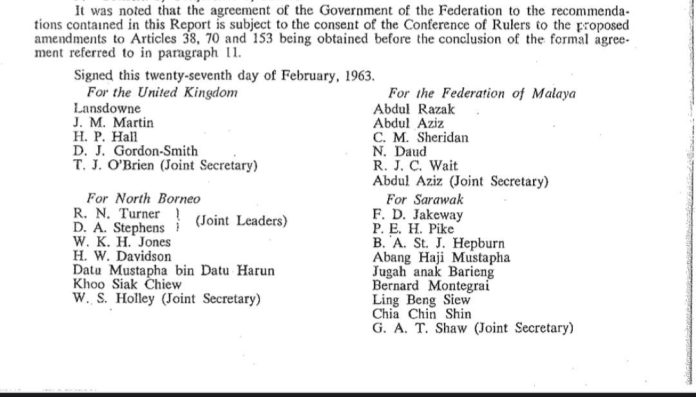By Remy Majangkim, MA63, Activist, Tutor, and Historian
KOTA KINABALU: Good day, everyone. I wish all of you good health. In recent days, it was announced that a new Malaysian Agreement Committee would include new faces from Sabah. This is great news for us all. As we all remember, back in Pakatan 1.0 (2018–2019), the then-state government achieved 17 out of 21 demands with the federal government in a short period of time. Now, with the remaining four involving oil and gas and the Continental Shelf,.
There are also murmurs and suggestions that the committee should emulate the 1962 Inter Government Committee. That is quite a dangerous offer and an attempt to rewrite the agreement. The big difference between the IGC Report 1962 and the current Malaysia Agreement Committee is the execution of the terms agreed.
In 1965, Singapore exited the Malaysia Agreement by declaring their independence and receiving their Singapore Bill from the British Parliament the following year. Then, a few years down the road, the nation was shocked by the race riots in Malaya. That subsequently led to the declaration of an emergency ordinance that lasted for 42 years (1969–2011).
By declaring an emergency period, all the power was shifted to the Central Federal Government. Thus, it has put an end to the obligation of the Federal Government to implement the Malaysia Agreement signed in 1963 until the country is back to normal. This is a good time for the federal government to rewrite their dominance over the Borneo States and our rich natural resources.
What many failed to see was the reason behind the formation of Malaysia. It is a trusteeship drawn up by the British, penned on the agreed terms in the form of the Inter Governmental Committee report (IGC Report), and finally inserted in the Malaysian Instrument. It was agreed to and signed by the British Parliament in the form of Malaysia Act Chapter 35 and by the Malayan Parliament in the form of Malaysia Act No. 26. Then the transfer of British colonies and territory is complete to Malaya, with Malaya held as a trustee.
This claim further strengthens with the involvement of the United Nations after the protests from the Philippines and Indonesia led to the signing of the Manila Accord (the British did not sign it). In response, the United Nations sends its teams to ascertain whether the will of the people is with Malaysia or not. This was done comprehensively, with people from the interior and townsfolk sending their views to the UN committee.
The team compiled the concerns dotted down and finally declared that the formation of Malaysia was valid. The United Nations declares the formation of Malaysia under UN Resolution 1541 (XV) under Principle 9. (Affirm the principle of decolonization compliance with the self-determination principle under integration.) Below is the declaration by the United Nations and the status of North Borneo and Sarawak, which are also registered with the UN Trusteeship Council.
Principle IX
Integration should have come about in the following circumstances:
(a) The integrating territory should have attained an advanced stage of self-government with free political institutions,
so that its people would have the capacity to make a responsible choice through informed and democratic processes;
(b) The integration should be the result of the freely expressed wishes of the territory’s peoples acting with full knowledge of the change in their status, their wishes having been expressed through informed and democratic processes, impartially conducted, and based on universal adult suffrage. The United Nations could, when it deems it necessary, supervise these processes.
So by now, it comes in full circle, complete with multiple safe guards.
So what is the role of this newly minted Malaysia Agreement 1963 committee? Their roles are to regain our rights, taken knowingly or unknowingly, back to the respective Borneo States. So the steering and technical committees must be well-versed in the relevant documents leading up to the formation of Malaysia. By rewriting what was agreed in 1962 with a new agreement, we require all original signatories to come back to the negotiation table. This involves the British (Settlor), Singapore (Independence State and Signatories), Brunei (Observer), State Sabah, and State Sarawak.
There should not be any new narratives whatsoever, and the committee should not give up an inch of real estate. Fight for our rights and not renegade from the original terms. There is a wise saying: “The sins of the father will be passed on to his children.”.


